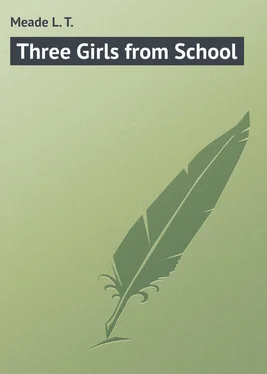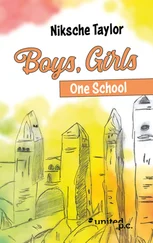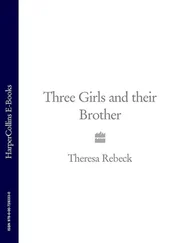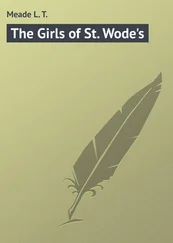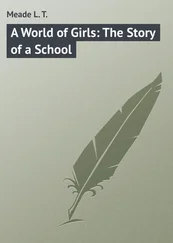L. Meade - Three Girls from School
Здесь есть возможность читать онлайн «L. Meade - Three Girls from School» — ознакомительный отрывок электронной книги совершенно бесплатно, а после прочтения отрывка купить полную версию. В некоторых случаях можно слушать аудио, скачать через торрент в формате fb2 и присутствует краткое содержание. Жанр: foreign_prose, foreign_children, на английском языке. Описание произведения, (предисловие) а так же отзывы посетителей доступны на портале библиотеки ЛибКат.
- Название:Three Girls from School
- Автор:
- Жанр:
- Год:неизвестен
- ISBN:нет данных
- Рейтинг книги:5 / 5. Голосов: 1
-
Избранное:Добавить в избранное
- Отзывы:
-
Ваша оценка:
- 100
- 1
- 2
- 3
- 4
- 5
Three Girls from School: краткое содержание, описание и аннотация
Предлагаем к чтению аннотацию, описание, краткое содержание или предисловие (зависит от того, что написал сам автор книги «Three Girls from School»). Если вы не нашли необходимую информацию о книге — напишите в комментариях, мы постараемся отыскать её.
Three Girls from School — читать онлайн ознакомительный отрывок
Ниже представлен текст книги, разбитый по страницам. Система сохранения места последней прочитанной страницы, позволяет с удобством читать онлайн бесплатно книгу «Three Girls from School», без необходимости каждый раз заново искать на чём Вы остановились. Поставьте закладку, и сможете в любой момент перейти на страницу, на которой закончили чтение.
Интервал:
Закладка:
Annie nodded. Mrs Priestley made a note of it, adding the date of Annie’s visit and the fact that she was a resident at Lyttelton School. She then, without any further ado, produced gold and notes to the amount of thirty pounds, which she folded up into a little parcel and gave to Annie.
“You will give us a receipt for this, miss,” she said; and Annie did so in due form. “And now, miss,” continued the woman, “all is well, and you will never hear any more with regard to this matter if we are paid our account in full; but if there is difficulty – and even rich ladies sometimes grumble at a bill such as we shall be forced to produce – then you may get into hot water. We will now wish you good-afternoon, miss, for our time is not our own but our customers’.”
How flushed Annie was! When she got into the open air she panted slightly. She looked up the street and down the street. She had had an awful time with Mrs Priestley, and she had quite forgotten the dress which was to be made for Mabel. She could not remedy that omission now, however; for nothing would induce her to see the terrible Mrs Priestley again. Her companions were not yet in sight, and she paced up and down thinking her own thoughts.
After a time she felt calmer. The money was safe in her pocket. There would be no fuss for three months at least. Annie was a sort of girl who could not think of trouble three months ahead. In half-an-hour she felt quite happy. The memory of her depression vanished, and when the girls on their bicycles hove in sight she met them with a gay word.
“You have had a ride!” she said. “I have been out of Mrs Priestley’s for ages.”
“I thought,” said Agnes Moore, one of the girls, “that you would never be tired of an interview with a dressmaker, Annie. Is she quite as imposing as people describe her? I go to Mrs Arnold, you know.”
“She is withering,” said Annie, with a laugh. “She invariably speaks of herself as ‘we,’ and is a perfect mass of pomposity. I do wish, Agnes, you could have heard the withering tone in which she alluded to ‘Mrs Arnold’s ladies.’ Oh dear, oh dear! I nearly died with laughter.” During the rest of the ride home Annie amused herself in taking off Mrs Priestley, which she did to the life. That very same evening thirty pounds in gold and notes had been transferred, first from Annie’s pocket to that of Mabel Lushington, and then from Mabel Lushington to Priscilla Weir.
Priscilla turned very white when her hand touched the little packet.
“It hurts me,” she said aloud. Mabel and Annie were both present when she made this remark, but neither of them asked her to explain herself. On the contrary, Mabel took Annie’s arm and hurried her away.
“How did you manage with Mrs Priestley?” she asked.
“It is all right, love,” said Annie. “She has added thirty pounds to your account.”
But Mabel looked not at all satisfied. “I didn’t want it to be done in that way,” she said. “Aunt Henrietta will be wild. She is always quarrelling with me about my dresses, and says that I spend twice too much on them. Good gracious! I do trust that I sha’n’t get into trouble about this.”
“You must not,” said Annie; “for if, by any chance, such a thing were to happen, I should never hear the and of it. Oh Mabel! I have done a lot for you. I have in a way made myself responsible. I had to. Mabel – I must tell you, for I think you ought to know – if there is any difficulty in paying Mrs Priestley’s bill, she means to tell Mrs Lyttelton about me – about me! – how I visited her, and asked her for the money; and she has my receipt to show. She put a stamp on it, and made me write my name across the stamp. Oh Mabel! I have done wonderful things for you, and you know it. You can never, never be grateful enough.”
“I suppose I am grateful,” said Mabel. “It was plucky of you to do that for me, Annie, and I am not one to forget.”
“We will enjoy ourselves in Paris,” said Annie. “I know Mrs Priestley won’t send in the account for about three months, so we’ll have a good time first, whatever happens.”
“Oh, if the thing is three months off, I’m not going to fret about it in advance,” said Mabel, who instantly became very talkative and lively.
Chapter Seven
The Poet
The days which passed between the occurrences related in the last chapter and the great prize day went on wings. The girls were all exceedingly busy. If there were many prizes to be won, and there was hard work beforehand to win them, there was the thought, too, of the long and delightful summer holidays to gladden each young heart; the reunion with fathers and mothers and brothers and sisters; the pleasures of the seaside resort or the country house; the knowledge that lessons, however useful in themselves, might be put away for six long, delightful weeks.
The girls were in the best of humour; and, as though Nature herself were in sympathy with them, the sun rose day by day in a cloudless sky, the flowers bloomed in more and more profusion, and the whole world seemed preparing for a grand holiday. Lyttelton School was famed for its roses, and the profusion of roses that blossomed during this special summer was long remembered by every member of the school.
Mabel Lushington was not a girl especially remarkable for conscientiousness. She was now completely under Annie’s spell, who, having won her point, was determined that there should not be a single flaw in her grand scheme. Her whispers about Mabel had spread a rumour in the school that Mabel Lushington, who had long been remarkable for her fine figure, handsome face, and a certain haughtiness of bearing, was also exceedingly clever. It is no easy matter to convert a girl who has hitherto been renowned as a dunce into a genius. Nevertheless, clever Annie managed to effect this object.
“She writes such good verses, you know,” Annie said first to one girl, and then to another; and as Mabel had been forewarned on the subject, she was not taken by surprise when the girls used to crowd round her and beg to see some specimens of her art.
“Oh, I can’t, I can’t!” Mabel would say, blushing and even giggling a little. “Don’t, don’t ask me; I should die of shame.”
These were her invariable retorts, and, as a rule, she managed to excuse herself with a certain amount of success. But schoolgirls are tenacious. The subject of Mabel’s gift for poetry became the general talk of the school, and finally a whole bevy of girls waited on Miss Lushington with the request that she would allow them to sample her poems.
“The fact is,” said Constance Smedley, “seeing is believing. You most read us something, Mabel; you really must.”
Mabel found herself turning pale, and Constance, who was a remarkably keen observer of character, noted the fact. Annie was nowhere within reach. Mabel began to feel as though a torture-screw were put on.
“Come, Mabel,” said Constance, “it is but fair. We love poetry, and will not be hard on you.”
“What I think is this,” said another girl. “Mabel is a satirist; she has been laughing at us all in her sleeve. She writes about us, and doesn’t want us to know. – Come, May, I know that is the case, otherwise you would not be so red.”
“She was pale a minute ago,” said Constance. – “What are you changing colour about, you silly old May? We won’t mind whether you satirise us or not. Come, get your verses.”
“I – I – can’t; I – won’t,” said Mabel. She had not an idea what the girls meant when they spoke of her as a satirist. She wished herself far away. As she said afterwards, she could have sunk through the ground at that moment. Her tortures were at their height when Annie Brooke appeared. Annie and Priscilla were crossing the lawn arm-in-arm. Annie had been talking eagerly. Priscilla, very grave and quiet, was replying in monosyllables. Suddenly Priscilla looked up.
Читать дальшеИнтервал:
Закладка:
Похожие книги на «Three Girls from School»
Представляем Вашему вниманию похожие книги на «Three Girls from School» списком для выбора. Мы отобрали схожую по названию и смыслу литературу в надежде предоставить читателям больше вариантов отыскать новые, интересные, ещё непрочитанные произведения.
Обсуждение, отзывы о книге «Three Girls from School» и просто собственные мнения читателей. Оставьте ваши комментарии, напишите, что Вы думаете о произведении, его смысле или главных героях. Укажите что конкретно понравилось, а что нет, и почему Вы так считаете.
